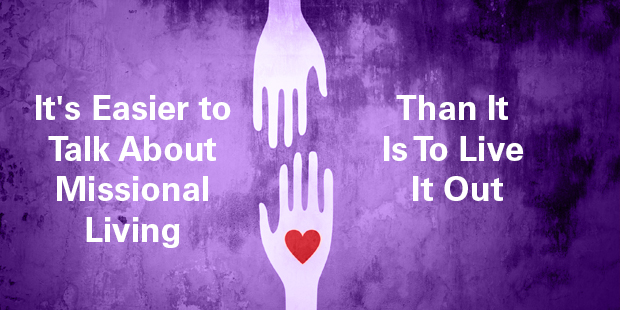
It’s Easier to Talk About Missional Living Than It Is to Live It Out
One of the things we’ve all heard a lot of talk about is what it means to be missional. It’s a relatively new word that has emerged into the conversation over the last few decades. It serves to remind the people of God that we are to live on mission.
While the word “missional” has emerged fairly recently, as a concept, it is actually built on theological ideas that date back a lot further—that themselves are built on the scriptures. It is part of a discussion about being shaped by the mission of God and serves as a reminder that the people of God are to live on mission.
Francis DuBose was the first person to use the word “missional” in a book with the modern definition. I won’t go into all of the details of the development, but if you are interested, you can read Mission Shift or other missiological on the subject.
But, suffice it to say, missional has become part of the mainstream conversation.
Mainline to Evangelical
In the mid last century, the mission conversation was dominated by the mainline traditions. However, over time that began to fade and much of that influence was lost (though later reengaged by people like the Gospel and Our Culture Network). While it has been influential elsewhere, the idea and emphasis was picked up in evangelical circles, which is what I will trace.
Evangelicals began to say, “Well, we need to live as agents of the mission of God. We need to shape and focus our ministries around the Missio Dei.”
And as evangelicals talked about these things, missional became a helpful adjective in front of things. It became missional church, or missional communities, or missional engagement.
From Concept to Culture
In the midst of this conversation, thinkers and writers began to frequently speak of missional and it became, in a way, an evangelical term. In fact, it became so well-used, “missional church” almost became an evangelical cliché.
As with many new phrases in the Church community, it almost became overused, and was hijacked to label things incorrectly. I actually heard one person talk about missional lighting.
Misuses of the Term
“If we could just have our lighting be more missional.” When I first heard this, it disturbed me because I didn’t have missional lighting and I now wanted missional lighting. But then it was disturbing because I realized you can’t slap missional on anything and determine the element is focused on the mission of God.
So as people began to write and to think on some of these issues, some used the word oddly and others pushed back on that meaning. Eventually, a group of us put together what was called The Missional Manifesto.
We gathered together Alan Hirsch, Tim Keller, J. D. Greear, Linda Burgquist, Dan Kimball, Eric Mason, and others. We wanted to discuss what we mean when we talk about being missional?
Of course, discussions alone don’t change a culture. People began to ask, “Well, what does it really look like in practice?”
Church and Culture
The concept of being missional started to be fleshed out in the context of church and culture. Inevitably, the question began to be asked, “How do we see missional ministry expressed in a local church setting?”
Part of the answer to that question arose as local church practioners began seek ways to help their people to live on mission. Many pastors looked around at other churches and in their own pews and found too many churches were filled with passive spectators rather than active participants in the mission of God.
Certainly, one way we would see this mission focus is that Christians would be engaged in serving as agents of God’s mission. Yet, the normal practice of the Christian life seemed to be one where we watch the show rather than engage in serving.
Missional Disconnect
We did a study at LifeWay Research of over 7,000 churches from all different denominations. We found that the majority of people in the majority of churches were unengaged in meaningful mission or ministry.
Leaders were asking how they could affect change. People were writing books and offer seminars on it. In the midst of all that, we began to hear a conversation that was becoming more common among churches. “How do we break down some of the divides that hinder people from serving?”
One of the divides I’ve written about is the one between the pastoral leadership and the congregation, what I have called the “clergification” of the church.
It has developed almost as a caste system for the clergy and lay people. “I’m clergy, so I’ve got my function and my role. And lay people, they don’t do, they kind of lay around.”
Part of the solution to this problem comes from the leadership. Unfortunately, having excellent, capable leaders has often resulted in disempowered, underwhelming servants. And I’m convinced that when pastors do for people what God has called the people to do, everybody gets hurt and the mission of God is hindered.
The Future of Missional
What is needed are excellent capable leaders who equip and empower the people of God to live out the mission of God within the context of their church and the culture around them, who will then raise up and empower others to do the same.
There has been a lot of talk about living in a missional way. In what way is the conversation helpful on the street level? In what way does the conversation come up short? How have you seen people not just talking about being missional, but living in a missional way?













